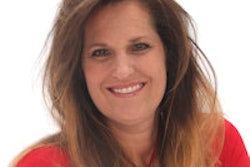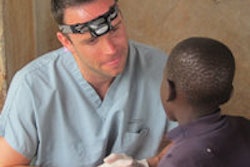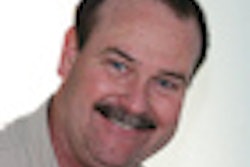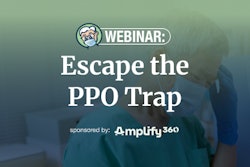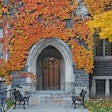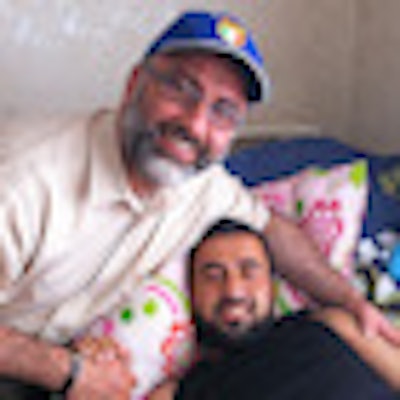
Twenty years ago, Othman Shibly came to the U.S. with $1,000 in his pocket and a dream.
A native of Syria and Lebanon, Dr. Shibly was a dentist in Syria at the time, with a wife and family. But when he was offered the opportunity to spend six months at the University at Buffalo (UB) School of Dental Medicine as a visiting doctor, he jumped at the chance.
"To study dentistry in America is very expensive, but it was a dream to come here and study," he said.
“It is not me -- it is the good heart of the people.”
Dr. Shibly arrived in New York and spent his first six months observing in the UB periodontal department. He quickly made a positive impression on the faculty, and after just two months Dr. Sebastian Ciancio, chair of the periodontology and endodontics department asked him to join a research project on a part-time basis. At the end of the six months, he was asked to stay another six months and participate in another research project, and they arranged to have his wife and family join him. A year later, they again asked him to stay on and offered to make him a part-time assistant professor.
"So I stayed another year and applied for a green card and got that, and because I was on the faculty, I got a tuition waiver under the faculty development program. So I was able to get my master's degree and then my American DDS and then my perio certificate," Dr. Shibly said. "So everything I dreamed of, I got it."
Political calculations, moral responsibilities
Today, in addition to being an associate professor in the department of periodontics and endodontics at UB, Dr. Shibly is pursuing a new dream: ensuring that people in his native country get oral health services and humanitarian aid in the midst of a civil war that has driven many into refugee camps along the Syria/Turkey/Lebanon and Jordan borders.
 Dr. Othman Shibly is pursuing a new dream: ensuring that people in his native country of Syria get oral health services and humanitarian aid in the midst of a civil war. All images courtesy of Dr. Shibly.
Dr. Othman Shibly is pursuing a new dream: ensuring that people in his native country of Syria get oral health services and humanitarian aid in the midst of a civil war. All images courtesy of Dr. Shibly.
According to recent news reports, when the United Nations (UN) withdrew its observers in Syria in June, deaths increased by 78%; in July, they rose another 55% and another 48% in August. More than 30,000 Syrians have died since the rebel uprising began in March 2011.
"The world and the United Nations and the Security Council have failed to protect Syria and the conflict areas," he said. "It is the world's responsibility to protect civilians, but because of political calculations, they failed to stand up for values and what the UN was established for. They let political calculations supersede their moral responsibilities."
In June, Dr. Shibly -- who still has many friends and family in Syria and goes back to visit every year -- went to Istanbul to attend a conference. While there, he had the opportunity to visit one of the refugee camps; what he saw electrified him.
"There were 11,000 people there at that time," Dr. Shibly said. "They came because the Syrian army is bombing areas in Syria, and civilians ran away and were carrying injured people to the hospitals."
He went to the hospital and came across a badly injured child being cared for but crying out in pain, he recalled.
"In the other room was his father, he also had very bad injuries, but he was asking about his wife and son," Dr. Shibly said. "So I went to the room where the mother was to check on her, and right after I entered she died. When I asked what happened to the family, I was told that when the army was bombing the city, he took his wife and kids in a car to get away but then they targeted his car with the bombing."
While he was there, Dr. Shibly performed oral screenings on people at the camp. "I saw a lot of broken jaws, missing teeth, caries, a lot of smokers," he said. "I started to think that I wanted to bring a dental mission from our university to the camp. But after I assessed the needs, I realized a mission would not satisfy their needs because they are too huge."
What they really needed was a fully equipped dental clinic, he realized.
"While I was there, I met refugees who are dentists also, and I said, 'If we provide a dental clinic, would you work there?' And they said, 'Of course,' " Dr. Shibly recalled. "So I decided to establish a clinic and have local dentists work there on a daily basis, then set up a Google calendar and have my dental colleagues in the States sign up to go and provide care as well."
Funding the project
 Dr. Shibly has been able to get enough equipment to set up two dental clinics. The clinics will offer services to refugees in the camps and people in the surrounding areas.
Dr. Shibly has been able to get enough equipment to set up two dental clinics. The clinics will offer services to refugees in the camps and people in the surrounding areas.
Once he returned to the U.S., Dr. Shibly began what he thought would be the most challenging aspect of his new venture: raising the money to support it. Instead, he quickly found a groundswell of support.
"When I came back here, I presented this idea to some in my community here in Buffalo, the Middle Eastern community, and they loved it and donated close to $11,000," he said. "I also have a friend in Waterloo, Ontario, who invited me to a fundraising dinner for a humanitarian aid project that he is involved with. I didn't really want to go because I was so focused on my own project, but I went anyway. And while we were sitting there, I told him about my project in Turkey, and he said it sounded like a good project, so he put it up on the board." By the end of the evening, he had another $40,000 in donations.
Dr. Shibly got the final funding he needed from another friend, a trauma surgeon who travels every month for two weeks to the Turkey/Syria border and actually goes into Syria to treat the injured.
"He said he wanted to go with me when I went back to set up the dental clinic, and I told him I was still raising money, that I needed another $10,000, and he said, 'It's on me,' " Dr. Shibly said softly.
Equipment and materials donations
Dr. Shibly has also been successful in getting enough equipment to set up not one but two dental clinics. The clinics are in two locations on the Turkey/Syrian border and will offer services to refugees in the camps and people in the surrounding communities. Services will include extractions and other emergency treatment, plus root canals, fillings, and other basic restorative and preventive care.
 Services at the dental clinics will include extractions and other emergency treatment, plus root canals, fillings, and other basic restorative and preventive care.
Services at the dental clinics will include extractions and other emergency treatment, plus root canals, fillings, and other basic restorative and preventive care.
"I wanted to do this very transparently and very quickly," he said. "Trying to get equipment from the U.S. to over there was going to take too much time and cost more because of shipping, so I realized it would be easier to buy the equipment in Turkey." Ultimately, he was able to get $100,000 worth of equipment for $70,000.
As of October 10, the clinics were nearly complete and Dr. Shibly was making plans to travel back to Turkey the week of October 15 to officially open them and begin treating patients. He will spend 10 days there getting the clinics up and running. He currently has enough funding, materials, and equipment to provide one month of services; after that, he plans to ensure that the project is "continually successful," providing humanitarian aid and meeting the dental needs of the Syrian refugees.
"I am being contacted by more people who want to go and help, and that tells you that people are nice," he said. "It is not me -- it is the good heart of the people. When they heard about something good, they all jumped in and got things done. So when people say, 'Thank you, Dr. Shibly,' I say, 'No, thank you, and forgive me because I have not done enough to help.' People could always do more."
If you are interested in donating time, money, or materials to Dr. Shibly's dental clinic project, contact him via email at [email protected].




